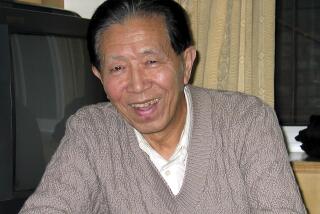Will SARS Be the Chinese Chernobyl?
- Share via
The Communist Party of the Soviet Union lost control over its domain between 1989 and ’91 for many reasons: It could no longer deliver on its economic promises, it could no longer control national movements that had emerged with the greater openness provided by General Secretary Mikhail Gorbachev and, most of all, it could no longer command legitimacy within its own society.
But a major event in the Soviet Union’s downward spiral was the accident at the Chernobyl nuclear power station in April 1986. The Soviet regime initially tried to keep a tight lid on what had occurred, but radioactive fallout was not confined to Soviet territory, and European governments were quick to announce that initial reports from Moscow underplayed the danger.
Soon the Soviet government had to acknowledge what had occurred and do something about it or jeopardize its efforts to build bridges to the West.
At home, the Kremlin was more successful initially at keeping information from its citizenry. But radicals in the intelligentsia, especially in places like Ukraine, where the accident happened, took advantage of Gorbachev’s programs of glasnost (openness) and perestroika (restructuring) to demand both information and action. In addition, Chernobyl and other incidents embarrassing to the regime allowed Gorbachev to purge entrenched interests from power by focusing blame on the old order, although this eventually contributed to the general loss of control.
Chernobyl alone would not have brought down the Soviet Union. But the government’s clumsy reaction and the growing demands for the truth on this and other issues helped stir the caldron of resentment that culminated in Soviet collapse.
Will severe acute respiratory syndrome, or SARS, prove to be a similar spark for change in China?
The Chinese government’s failure to provide sufficient information has already led to complaints around the world for more openness and action to stem this growing international health risk.
Failure to respond adequately will further damage the hopes of neighbors and economic partners that the Chinese Communist Party is truly a force for modernization.
Finger-pointing already has led some officials to be purged, as happened in the Soviet Union in response to the Chernobyl accident. Although a purge of this kind can be a convenient way for a new regime to get rid of entrenched interests that might oppose new policies, it also can lead to party warfare.
Most important, the Chinese government’s failure to respond adequately will embolden those who seek greater openness.
Any government that causes unnecessary deaths because it withholds information is inviting questions of its legitimacy and authority to govern.
Although the regime can still control information within China’s borders to a significant extent, such control is an even greater challenge in today’s interconnected world than it was in April 1986.
Just as Chernobyl’s effects were not felt until further opportunities to speak out and mobilize became available -- thanks to the Soviet government’s political and economic modernization program -- the effect of SARS on the hold of the Chinese Communist Party may not be known immediately.
But any regime claiming a monopoly on truth can ill afford to raise questions in its society about its ability to provide for the health and well-being of the population.
To date, the Chinese Communist Party has avoided the Gorbachev approach of allowing greater freedom in society simultaneously with its economic modernization program. Because the economy has been growing, it has been easier to block demands for greater openness, and the party has been able to transfer power from one Communist leader to the next.
But evidence that the government cannot be trusted with the lives of its people may provide dissidents with the ammunition they need to raise questions.
In a few years, we may look back on SARS as China’s Chernobyl.
James M. Goldgeier is director of the Institute for European, Russian and Eurasian Studies at George Washington University and a fellow at the Council on Foreign Relations.
More to Read
Sign up for Essential California
The most important California stories and recommendations in your inbox every morning.
You may occasionally receive promotional content from the Los Angeles Times.










